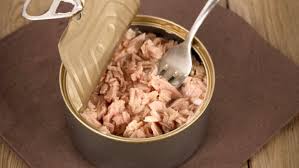
3/5 experts say yes.
It’s not the sexiest fish in the sea. But tuna—even once it’s caught, frozen, thawed, cooked, chopped and canned—still gets a nod of approval from most of our experts. Still, some aren’t pulling out their can openers anytime soon.
First, though, some tuna praise. A typical five-ounce can of light tuna has 28 grams of protein, an impressive 56% of your daily requirement.
It’s also a great source of the heart-protective omega-3 fatty acids EPA and DHA. But all tuna is not tinned equally. In a study published in Public Health Nutrition, researchers analyzed canned tuna products in U.S. grocery stores. Tuna packed in water had higher EPA and DHA counts and lower omega 6: omega 3 ratios, compared to those packed in oil.
Mercury is the primary concern in big fish like tuna. Pollution releases mercury into the air, and as it accumulates in the ocean, fish absorb it from the waters and their mercury stores build up, according to the FDA. When you eat certain kinds of fish—especially big, fatty fish like tuna—mercury can build up in your bloodstream over time, too.
I – Word Understanding
3/5 – three out of five
Tinned – preserved / packed in a tin can
Mercury – a toxic substance that can damage kidneys, liver, heart and cause nuero developmental deficits in children
II – Have Your Say
1. Do you like tuna? What other seafoods do you prefer and why?
2. What are your concerns when it comes to eating seafoods? What do you know about pollution that affect sea products that we consume?
3. The chemical bisphenol A, or BPA, is an endocrine disruptor often present in the linings of canned foods. Studies show that eating canned foods can increase BPA levels, while eating more fresh food can reduce it. How is your consumption of canned foods? Do you think there is a better (and healthier) packaging we can use instead of tincans?

